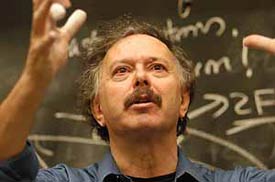UC Berkeley Press Release
 |
Chief Petty Officer John David Shelton, during his tour in Iraq. Shelton served as a member of a Navy counter-IED team. |
Communiqué from a soldier
Learning the laws of physics
from the belly of a HUMVEE can be 'otherworldly'
By Cathy Cockrell, NewsCenter | 26 October 2007
BERKELEY — Since 2000 UC Berkeley professor Richard Muller has taught his popular course "Physics for Future Presidents," relating important concepts in physics to global events and issues. As webcasts and podcasts of Physics 10 have become available online — on webcast.berkeley.edu, iTunes, Google Video, and now YouTube — he realized he was reaching far more minds each semester than the 500 potential Commanders in Chief in his Pimentel lecture hall. At least in theory.
At a session in March 2006, Muller put the question to his students in cyberspace: "From Walla Walla to Timbuktu," if you're watching or listening, send word.
The first e-mail response came from Kansas City, Mo. It's been followed by hundreds of other messages — at latest count from 72 countries and from 48 of the 50 states (South Dakota and Arkansas, where are you?). "I was just listening to your first of three lectures titled 'Quantum,'" wrote an NGO worker stationed in Bamako, Mali. "Consider yourself contacted from Timbuktu. I plan to be there later this month, and I assure you I will have your lecture playing on my MP3 player as I plod away by camel." (See excerpts of some of those e-mails).
 Richard Muller (Peg Skorpinski photo) |
Some wrote from war zones. A U.S. Marine who had just completed three tours in the infantry, wrote to say that while based at Camp Habbaniyah, in central Iraq, he had "listened to just about every 'Physics for Future Presidents.' If you ever see Alex Filippenko or Joshua Bloom" — two Berkeley astronomers whose lectures are available online — "tell them I loved their lectures, too," he added.
Another arrived with the subject line "Thank you from a grateful sailor in Iraq." The author was John David Shelton, a member of a Navy counter-IED (improvised explosive device) roadside taskforce, who wrote to say that the "Physics for Future Presidents" lectures "have been a lifeline for me."
We recently contacted Shelton to ask him to elaborate. Now a chief petty officer at the Pensacola Naval Air Station, where he instructs helicopter and aircraft crew, Shelton wrote back. After explaining how he downloaded the physics series to his iPod before leaving for Iraq, he went on:
My experiences listening to his lectures over there were, for lack of a better word, otherworldly. We would often ride patrols between Baghdad and Ramadi and I would listen to his lectures in one ear and the HUMVEE com system in the other. Once I was out on mission and did the same while manning a .50-caliber machine-gun turret, watching over a goat herder's field, where insurgents were suspected of passing through a week prior.
John David Shelton
Now imagine this scene: I haven't showered in over 36 hours, temperatures are hitting near 110 degrees, I'm as filthy as I can ever remember being because of the blowing dust, a goat herder and his family tending their goats pass by our vehicle — once in the morning and once during the evening, going in the other direction, each time waving a white flag to make sure they aren't accidentally shot — and I've got physics going in one of my ears. Back on the base, I would take a cot outside at night and use my night-vision goggles to look at stars and constellations while listening to Professor Muller….
Even though I consider myself a smarter-than-average individual, I was never able to attend college. So I'm mostly self-educated in anything beyond the high school level. I've always enjoyed science — [science writer] Carl Sagan and [Nobelist and physics popularizer] Richard Feynman being my two heroes, so to speak. And now, after listening to Professor Muller's lectures, he ranks very close to them.
It's impossible for me to pin down exactly what I learned listening to his lectures. Some of it I already knew, some of it clarified concepts I was vague on previously, but a good portion of it was completely new, and it was all enjoyable. Professor Muller calls his course 'Physics for Future Presidents,' I assume in order to grab the attention of undergrads signing up for their requisite science course. But I feel a more appropriate title would be 'Physics for Useful Citizens.' What he teaches is, to me and I'm sure to him, too, the basics needed to be an informed, critical thinking citizen of our country….
I'm just blown away when I think that I have received an Ivy League education in basic physics for free! And not just because it's free either; even if I had the money, what are the chances I could make it into Berkeley and then make it into his class? Probably pretty slim.
The professor responds
| Course-casting by the numbers |
|
UC Berkeley first began webcasting entire academic courses in 2001. Since the October launch of the university's initial offering of courses and events on YouTube, "the numbers have gone through the roof," reports Richard Bloom, course-cast administrator for Educational Technology Services (ETS). "We were all pretty amazed at the speed that it took off and the number of views." YouTube offers free access to more than 400 lectures for eight UC Berkeley courses — in physics, biology, information technology, chemistry, engineering, and peace and conflict studies. Total hits during the first two weeks (Oct. 3-17, 2007): 859,000+. Campus podcasts and webcasts on other platforms
include: |
Professor Muller calls Shelton's missive "one of the most rewarding letters I've ever received — the fact that I can touch people around the world in such distant locations, working under such extreme conditions, and affect their lives…."
As for Shelton's theory about the course title, the professor puts it differently: "I named it 'Physics for Future Presidents' to alert students that it's different from anything they've experienced or expected." For "non-math people," physics is often presented in a way that makes them feel inferior, Muller says. "I've had similar experience trying to take a music class. If they discover I have difficulty singing in key, I get snide remarks, I feel uncomfortable and unwelcome. And yet I love music."
With that object lesson in mind, he works to make his presentations on matter, motion, space, and time engaging and relevant. "I imagine that one day, when one of them is president, I'll say 'why didn't I teach that student X'?'…. So each lecture is focused seriously on what I'd want future president to know."
(Presidential hopefuls, take note: Muller has written a trade book — titled (what else?) Physics for Future Presidents — that he reports will be published by Norton in early 2008. "It's designed to be read by the candidates," he says, and ideally as well by journalists, equipping them to pose challenging and serious questions on our energy future, nuclear weapons, global warming and other matters that have much to do with physics.)
"People make fun of Internet education. But I'm in the thick of it and am seeing the response around the world," Muller notes. "The mandate of the university is to educate; that's why we are here. We're a public university and we want to educate as many as possible, so we're big. Yet there's a limit to how many one university can accept."
Online course-casting changes the equation. "People interested in serious education can find the UC lectures….," says Muller. "They don't get course credit, but they're doing it anyway — and to me that makes these among my best students. They really want to learn."
As for the correspondence hitting his inbox, "I used to answer every one," he says — but admits he is rapidly losing ground. "I'm 156 behind right now. I'm realizing it's going to swamp me."

